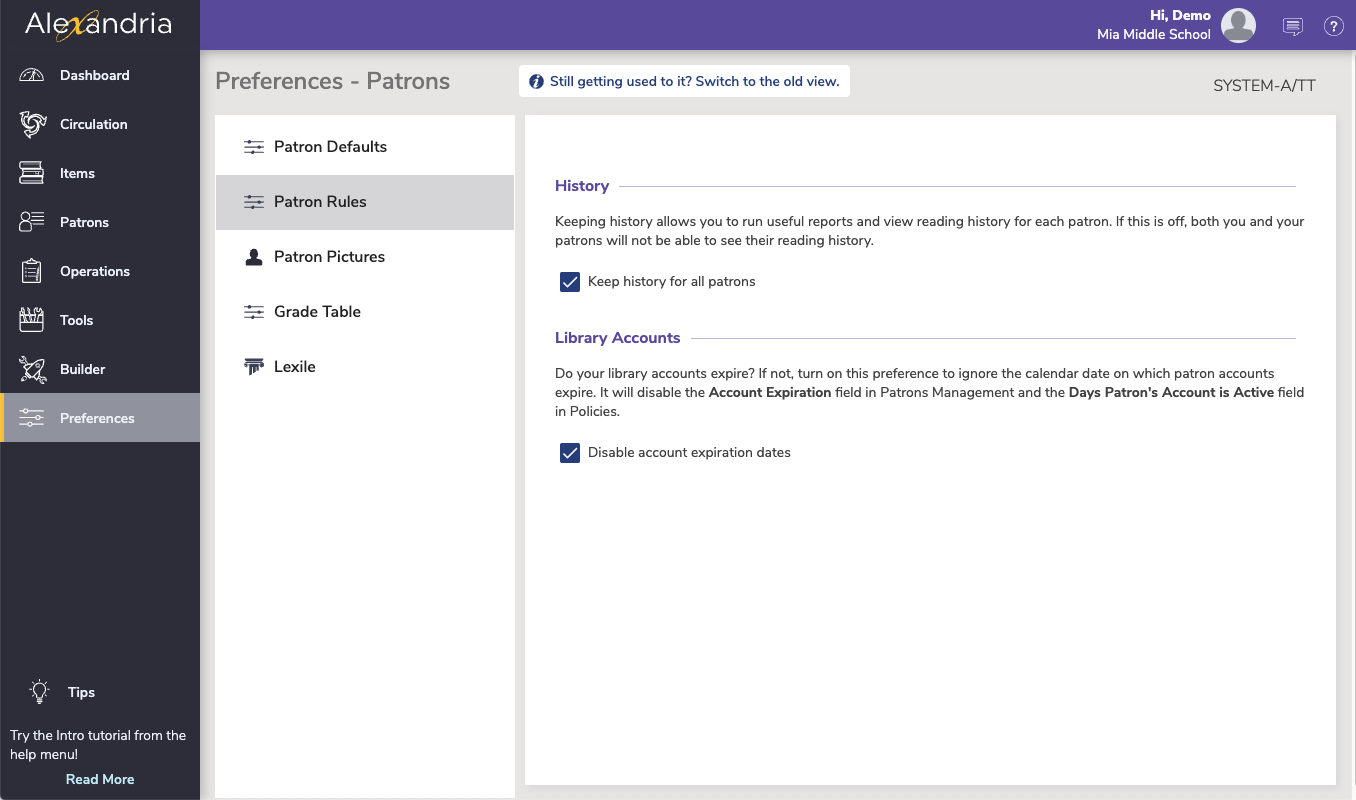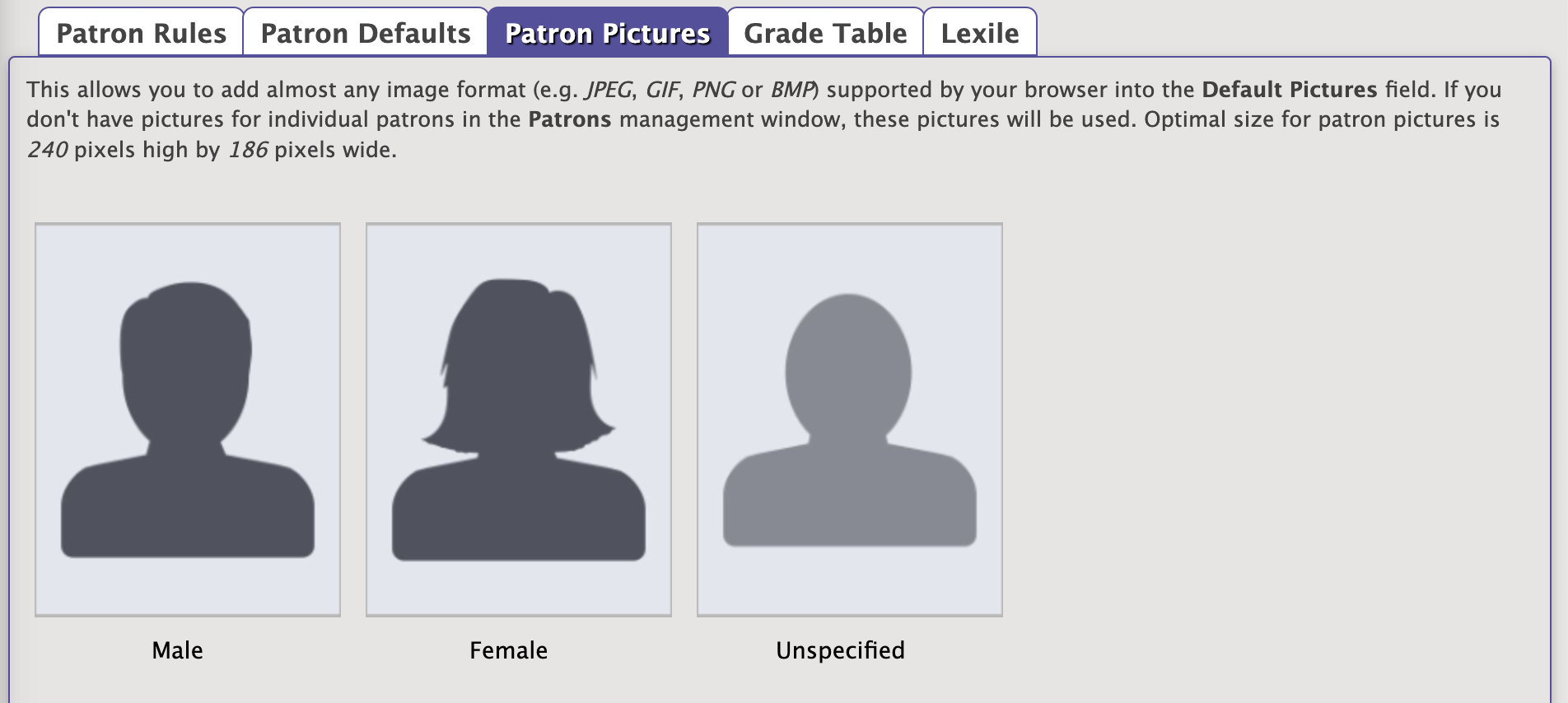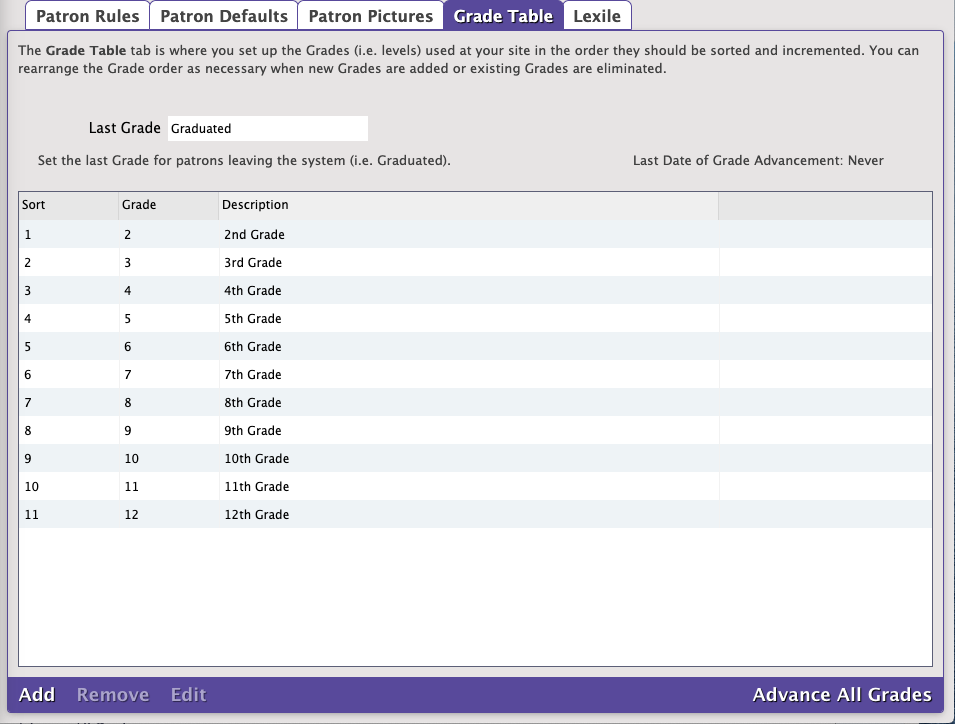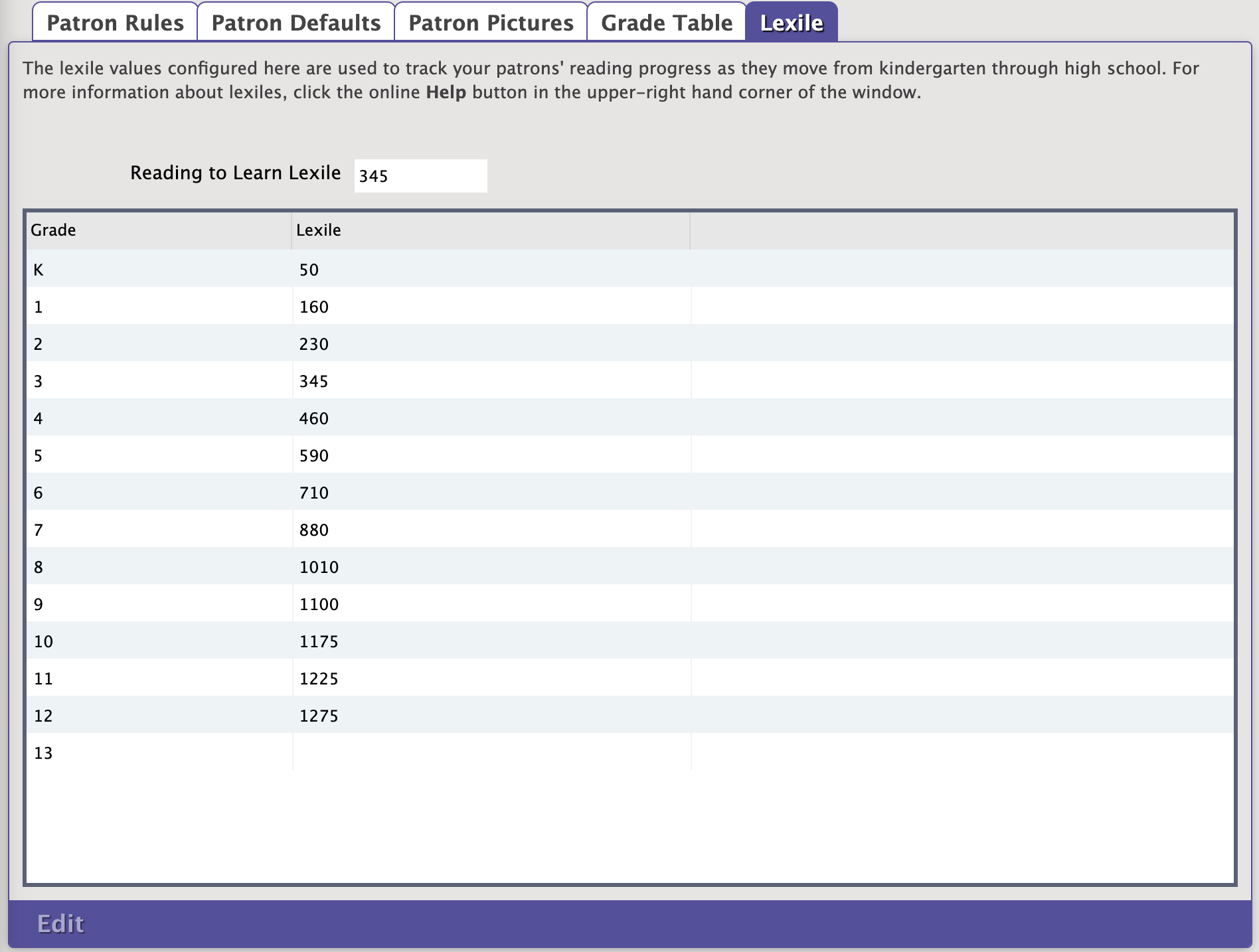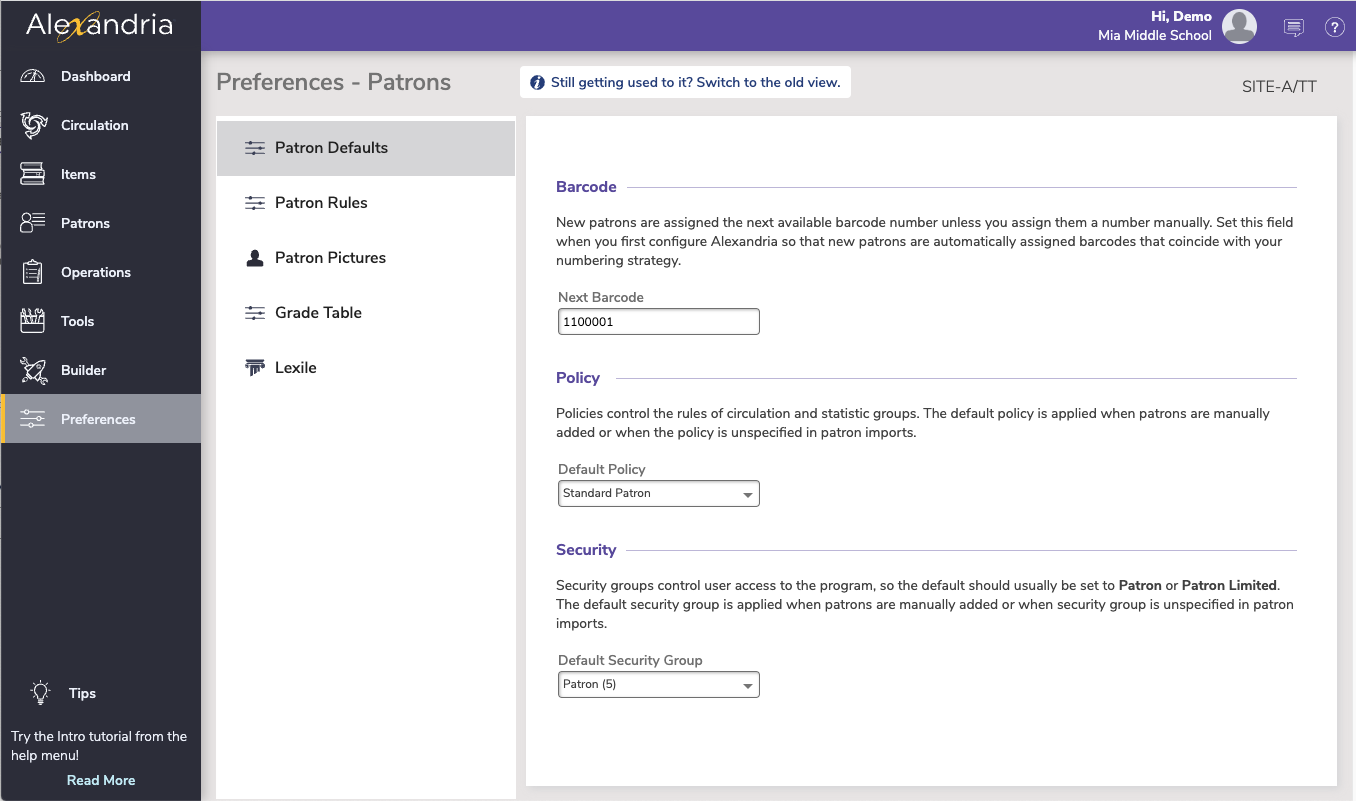How helpful was this page?
Related Blog Posts
Blog Posts
-
Winter storms–recompute due dates
created by
Jan 23, 2024
-
Cleaning up the grade table–Authority Control
created by
Apr 26, 2023
-
Make a calendar just for the senior class!
created by
Aug 02, 2022
-
When does an overdue item become lost?
created by
Mar 15, 2022
-
Setting rules–Patron Policy Preferences
created by
Mar 08, 2022
-
Seeing double (barcodes) on patrons and items?
created by
Feb 23, 2022
-
Automatic email notices... What are you waiting for?
created by
Nov 17, 2021
-
Winter (break) is coming! Are your period due dates set?
created by
Oct 20, 2021
-
Unused Barcodes: Reporting for Duty
created by
Sep 15, 2021
-
Introducing... FAQs!
created by
Jul 07, 2021
Patron Rules Preferences
Keep history for all patrons. When checked, a complete transaction history will be kept for all the patrons who are added to your library system.
Disable account expiration dates. Ignores the calendar date when patron accounts expire, and disables the Account Expiration field in Patrons Management and the Days Patron's Account is Active field in Policies.
Patron Pictures
You can apply generic Male, Female, or Unspecified images to patrons if they don't have an individual profile picture attached to their record on the Personal tab of Patrons Management; pictures are assigned based on the gender value selected for each patron.
You can affix nearly any image supported by your browser (commonly accepted formats are JPEG, GIF, PNG, or BMP) into one of the three gender-based patron picture fields. If you don't have individual patron portraits assigned on the Personal tab of Patrons Management, these pictures will be used instead. Optimal image size for patron pictures is 186 pixels wide by 240 pixels high.
New Default Patron Images
Apply New Default Patron Pictures
Follow these steps to apply new gender-based patron picture defaults:
- Select (highlight) the default patron picture you would like to change (e.g. Male, Female, or Unspecified).
- New default patron images should measure no larger than 186 x 240 pixels.
- New default patron images can be JPEG, GIF, PNG, or BMP (or any other image format that your browser supports).
- Drag-and-drop your new default patron image onto the Default Picture field.
- Click Save to apply your changes or Revert to discard them.
Grade Table Preferences
Individually enter each grade level relevant to your union in the order they should be sorted and incremented. This is a simple list; the first entry in the Grade Table will be your first grade level, the second will be the next grade level, etc. The Grade and Description entries in the table are fully customizable, allowing you to use whatever terminology you desire. Grades must be advanced manually at the end of each school year by using the Advance All Grades button or the Advance Patron Level utility. Using one of these utilities, you can advance your patrons to the next grade level until they reach the Last Grade level (e.g. Graduated); patrons will never advance past the Last Grade level.
Settings
Last Grade
This user-defined field defines your patron's highest (and final) level of advancement. This level will be assigned to patrons who go beyond the levels defined in the Grade Table. Patrons will not be advanced out of this level when grades are advanced. Default is Graduated and the field must contain a value—it cannot be left blank.
Last Date of Grade Advancement
This non-editable field shows when the latest Advance All Grades operation was performed; the date is updated after the utility has completed.
Advance All Grades
Each time this is clicked, you essentially add one grade level to each of your patrons until they reach the Last Grade level (described above). To elucidate, each patron in your database that has been applied a level that you defined in your Grade Table will have their level transitioned to the next grade in the table. For example, a patron with the grade level of 6 will advance to 7. COMPanion recommends that you perform an Archive before using the Advance All Grades button. Patrons whose grade/level is either not found or not defined in the Grade Table will not have their grade level advanced.
For the Advance All Grades utility to work, grades in the Grade Table need to exactly match the Grade field entry in Patron Management records. Sometimes the grades defined in the patron record are mistakenly padded with “0”s which causes the Advance Grade utility to fail.
Another example of an error-causing incongruence would be a patron with “5th” in the Grade field of their patron record when “5” is the standard defined in the Grade Table preferences.
Add a New Grade Level
- Click Add to add a new level to the grade table. In the dialog, enter the following information:
- Sort. Enter the sort order for the grade.
- The sort value you provide changes where the grade appears in the Grade Table and how grades are advanced.
- For example, if the earliest grade level you support is kindergarten, then “1” should be your Kindergarten Sort value. If, at a future date, you incorporate a new preschool level and that becomes your new “1”, then your Kindergarten Sort value will be automatically bumped to “2”.
- Grade. Enter a simple grade name.
- This title will be added to the Grade drop-down menu in Patrons Management, Patron Details, Patron Reports, etc.
- Description. This is a more common or explanatory version of the grade name.
- For example, your description for grade “7” could be “7th Grade”.
- Sort. Enter the sort order for the grade.
- Click Add to close the dialog.
- Finally, click Save to keep your new grade level or Revert to discard it.
Remove a Grade Level
- Select the grade and click Remove.
- When you are finished, click Save to keep your changes or Revert to discard them.
Edit a Grade Level
- Select the grade you would like to modify and click Edit.
- In the dialog, edit information in the Sort, Grade, and Description fields. If you modify the Sort order, the grades in the table will be adjusted automatically.
- When you're finished making changes, click Save to close the dialog.
- Finally, click Save to keep your changes or Revert to discard them.
Patron Lexile Preferences
Reading is essential to your patron's success. The lexile values established here are used to track your patron's reading progress as they move from kindergarten through high school. For more information on the importance and increasing performance of lexile scoring, please review the corresponding Alexandria Lexiles section.
Settings
- Reading to Learn Lexile. The lexile value at which a patron has moved from Learning to Read to Reading to Learn. The transition from Learning to Read to Reading to Learn usually occurs between the third and fourth grade; therefore, the default Reading to Learn Lexile value is commonly set somewhere between 345 and 460.
- Color Lexile Graphs. Use color in lexile progress graphs. Graphs without color are easier to read when printed in black and white or grayscale. This preference also affects the printed and on-screen outcome of your patron Lexile reports.
Further Reading
Patron Defaults
Use these preferences to configure some of the default settings applied to new patrons when they are added to your system; for example, set the patron's Default Policy and Next Barcode.
Settings
Barcode Settings
- Next Barcode. New patrons are assigned this, the next available barcode number, unless you assign them a number manually. You should set this field when you first configure Alexandria so that new patrons are assigned barcodes that coincide with your numbering strategy.
Policy
- Default Policy. Select the default patron policy to use for new patrons. If a user-created patron policy is selected and later removed from your Policies, this preference will revert back to Standard Patron. Review the Policies section for more information about implementing policies for patrons and items.
Security Groups
- Default Security Group. Select the security group you want applied to new patrons by default; ordinarily, this should always be set to Patron or Patron Limited. Review the section Preferences Configuration Security for more information about assigning (and removing) access levels for patrons and operators.


